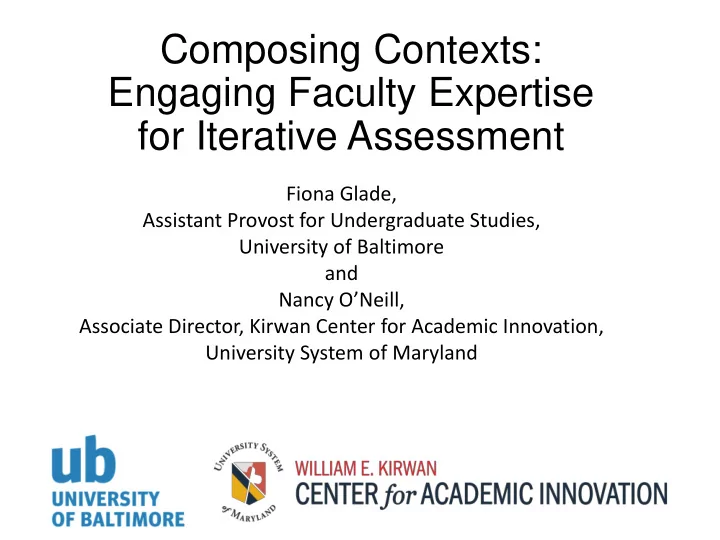

Composing Contexts: Engaging Faculty Expertise for Iterative Assessment Fiona Glade, Assistant Provost for Undergraduate Studies, University of Baltimore and Nancy O’Neill, Associate Director, Kirwan Center for Academic Innovation, University System of Maryland
OUR PLAN • Envision a “Next” Engagement • Some Practices to Consider (GE and writing) • Before • During • After • Wrap Up
WHAT’S NEXT? Write/ Revise SLOs Act Upon Identify Evidence Assessment (Alignment, Method(s) ID, Pedagogy) and Evidence Analyze/ Collect Interpret Evidence Evidence
BEFORE – Gen Ed • No existing framework • Outcomes were unwieldy (pp. 1-2 of handout) • Event: 3-day, late summer retreat with GEC + guests
BEFORE – Gen Ed • Crafted agenda as a planning team • Mostly staff led (summer) • Identified frameworks & outcomes to review (SLCC, SJSU, UNLV, UMD) • Agenda had “loose structure”
BEFORE – Gen Ed • A rranged for System rep. on pending changes to state reqs. • Conducted a credit analysis of degree granting programs • Goals: “roll up sleeves” and have something to show for it
BEFORE - Writing • Kathleen Blake Yancey: assessment as “a knowledge - making endeavor ” • Set Up: • collectively articulate a purpose for the assessment task
BEFORE - Writing • Best practices nationally • Peer institutions • AACU Value rubrics • Brief articles on portfolios • Student artifacts
BEFORE - Writing • Partnering for resources • Teaching and Learning Center • Faculty ownership and expertise • Timing: meet faculty where they are
PLANNING BREAK Take 3 min. to write down some prep. notes/strategies for your event.
DURING – Gen Ed • Grounding exercise: Why Gen Ed? • Reacted to sample frameworks in small groups: signature • Early, tangible product: drafted framework btw day 1 & 2
DURING – Gen Ed • SLOs – program mapping • Drafting rounds (frequency + disciplines) • Discoveries – policy holes, vestiges of older programs
DURING - Writing • Considering multiple contexts: • Best practices nationally • AACU, WPA, CCCCs . . . • Our institutional mission • Our GE course sequence • Faculty concerns • Combining contexts — best practices with local insights
DURING - Writing • Dynamic Criteria Mapping (adapted from Bob Broad) • Beyond the rubric(s) • Collaboratively drafting documents: • Student learning outcomes • Signature Assignment outlines • Portfolio guidelines
PLANNING BREAK Take 3 min. to write down what you might have faculty composing/ iterating/ reviewing/ thinking together around during your event (include deliverables).
AFTER – Gen Ed • Write-up – capturing the story of our shared work • Obtain endorsement of area studies SLOs by faculty in areas • Degree program outcomes analysis • Begin to plug holes in policy, address “vestiges”
AFTER – Gen Ed • UB: • GE and GR SLOs • GE SLOs assessed by GEC (faculty reps from each college) • GR SLOs assessed by program faculty in coordination with GEC • MSCHE commendation for process and clear responsibility
AFTER – Gen Ed • USM: • General Education Symposium • Regular convenings and support for Gen Ed directors • Consulting around Ged Ed reform
AFTER - Writing • Understanding that program improves based on assessment and that assessment is iterative • Reflecting on what is most valued in/by the discipline • Affirming through portfolio scoring sessions using dev. rubric
AFTER – Writing Program Assessment Rubric: University of Baltimore Writing Program Developmental Rubric: Program Assessment thorough proficient emerging minimal level of achievement 4 3 2 1 Outcome #1 Discusses rhetorical situation of portfolio documents, writes with understanding of Rhetorical audience in different rhetorical situations, and presents documents in at least four different knowledge genres. Outcome #2 Discusses strategies for drafting, revising, and editing; shows evidence of revising Writing process effectively in response to feedback; demonstrates purposeful research strategies; does not strategies demonstrate significant need for further revision. Outcome #3 Guides readers through the portfolio to showcase a range of effective writing strategies, Metacognition and discusses own literacy history including his/her growth as a writer, and evaluates own self-reflection writing effectively at various stages. Outcome #4 Applies genre, format, and structure conventions appropriately in all portfolio documents; Textual conventions integrates and documents source materials effectively using relevant style guidelines. Outcome #5 Demonstrates proficient control of grammar, sentence variety, word choice, and Proofreading appropriate conventions; uses a range of effective strategies for editing and proofreading; strategies does not demonstrate significant need for further editing.
PLANNING BREAK Take 3 min. to write down some communications and follow-on activities out of your event.
WRAP UP • Some examples from the group? • Contact Info.: • Fiona Glade, fglade@ubalt.edu • Nancy O’Neill, noneill@usmd.edu
Recommend
More recommend